Act I
The poor and bashful Nemorino is hopelessly in love with the rich and beautiful Adina. He hears her reading aloud the legend of Tristan, who has won the heart of Queen Isolde using a magic love potion. While Nemorino is dreaming about this magic potion, soldiers under the command of Sergeant Belcore enter the village. Adina immediately attracts the brave warrior's attention. He does not plan to hang around long: let Adina name the wedding day immediately! And yet the girl dislikes the sergeant's self-assurance. She cunningly and coquettishly spurns the advances of her unlucky admirer. Seizing the moment, once everyone has left, the unhappy Nemorino hastens to declare his love for Adina, but the mischievous imp tells him that faithful and constant love is not for her.
The itinerant medicine man Dulcamara, a charlatan and scoundrel, arrives in the village. The sales of "miracle-balsams" are well underway. The unfortunate Nemorino, too, turns to him for help: "Do you not have Isolde's love potion?" Pleased to be addressing such a simple fellow, Dulcamara gives the youth a bottle of everyday Bordeaux and promises that the "elixir" will act within a day, calculating the amount of time he needs to get far away from the place. Nemorino's impatience is so great that he immediately drains the bottle of its "elixir of love". He believes that the potion is having an immediate effect. Confident that Adina will soon fall in love with him, Nemorino feigns coldness. Such novel and unexpected behaviour from her admirer wounds the girl's pride. The arrival of the sergeant gives her a hint as to how she can repay Nemorino. She promises her hand to Belcore. Suddenly the sergeant receives the order to abandon the village. Adina agrees to hold the wedding that very day. Nemorino's head is instantly cleared of tipsiness. Understanding that he is losing his love forever, the luckless youth begs her to postpone the wedding at least until the next day.
Act II
Preparations for the wedding are underway, and the guests are drinking and having fun. Dulcamara asks Adina to sing a new song for two voices with him – a barcarolle about a senator and a boatwoman. Reeling at the news that the notary has appeared, Nemorino begs the doctor to save him – to make the people fall in love with him before the next day arrives. Naturally, the charlatan recommends that the youth purchase another bottle of the elixir – to increase the potency of the drink. In order to earn money and acquire his next dose of the potion, Nemorino becomes a recruit in Belcore's regiment. Holding the precious coins in his hands, he hastens off to find Dulcamara.
News unexpectedly flies around the village: Nemorino's uncle has died in the city, leaving him his entire fortune. Only Nemorino, emboldened by the second portion of the doctor's "elixir of love", is unaware of these events. Dulcamara guarantees that this time the drug will definitely work, and the lad is filled with the most glittering expectations. On his way, indeed, the first girl to meet him – Giannetta – pays heightened attention to him because now he is a rich single man. Dulcamara is amazed. It would appear that the contents of the bottle truly are magic. Adina witnesses Nemorino's unprecedented success with the ladies and learns that he has joined up to be a soldier to win her heart. Dulcamara, seeing Adina's jealousy, offers her his elixir of love. But the beauty has no need of the sorcerer's services, she having an elixir no less powrful than his: "The recipe is written on my face, the potion in these eyes".
Nemorino's drunkenness has passed, and again he laments Adina. The tear of offence in her eyes tells him that he, too, is loved. At the same time, Adina purchases the recruit list from Belcore. She hands the contract to Nemorino, persuading him not to leave his home village. The youth is disappointed: he had expected a declaration of love. "As no-one loves me, I'd rather die a soldier!" he exclaims. The perturbed Adina at last opens her heart and falls into the arms of her beloved. Belcore is by no means dejected: there are many more women on the face of the earth. Dulcamara is inspired by the success of his curative drink.
Place: A small village in the Basque Country
Time: The end of the 18th century
Act 1
Nemorino, a poor peasant, is in love with Adina, a beautiful landowner, who torments him with her indifference. When Nemorino hears Adina reading to her workers the story of Tristan and Isolde, he is convinced that a magic potion will help him to gain Adina's love. The self-important Sergeant Belcore appears with his regiment and immediately sets about courting Adina in front of everyone. Nemorino becomes anxious (although, Adina meanwhile secretly derides Belcore's complacency) and, alone with Adina, reveals his love for her. Yet Adina rebuffs him, saying she wants a different lover every day and following her example would do Nemorino better. Nemorino declares that his feelings will never change. The travelling quack doctor, Dulcamara (the self-proclaimed Dr. Encyclopedia), arrives, selling his bottled cure-all to the townspeople. Nemorino innocently asks Dulcamara if he has any of Isolde's love potion. Despite failing to recognise the name "Isolde", Dulcamara's commercial talents nevertheless enable him to sell a bottle of the cure-all – in reality only cheap wine – to Nemorino, withdrawing all his savings.
To make a safe escape, Dulcamara tells Nemorino the potion needs 24 hours to take effect – by which time, the doctor will be long gone. Nemorino drinks the potion in a haste in order to watch the effect tomorrow. Emboldened by the "elixir" (in fact, drunk), Nemorino feigns indifference when he encounters Adina, as he expects that the elixir will facilitate his conquest of Adina the following day. She becomes increasingly annoyed; perhaps she has feelings for Nemorino after all? Belcore returns and proposes marriage to Adina. Still riled by Nemorino and wishing to give him a lesson, Adina falsely promises to marry Belcore in six days' time. Yet Nemorino only laughs in response: such confidence is sustained in the belief in the magic potion. However, when Belcore learns that his regiment must leave the next morning, Adina promises to marry him before his departure. This of course panics Nemorino, who cries out for Dr. Dulcamara to come to his aid. Adina, meanwhile, invites everyone to the wedding.
Act 2
Adina and Belcore's wedding party is in full swing. Dr. Dulcamara encourages Adina to sing a duet with him to entertain the guests. The notary arrives to make the marriage official. Adina is annoyed to see that Nemorino has not appeared, for the whole deal has been intended only to punish him. While everyone goes to witness the signing of the wedding contract, Dulcamara stays behind, helping himself to food and drink. Having seen the notary, Nemorino appears, depressed, as he believes that he has lost Adina. He sees Dulcamara and frantically begs him for a more powerful, faster-acting elixir. Although Dulcamara is proud to boast of his philanthropy, upon discovering that Nemorino now has no money he changes his tune and marches off, refusing to supply him anything. Belcore emerges, musing about why Adina has suddenly put off the wedding and signing of the contract. He spots Nemorino and asks his rival why he is depressed. When Nemorino says he needs cash, Belcore suggests joining the army, as he'll receive funds on the spot. Belcore tries to excite Nemorino with tales of military life, while Nemorino only thinks of getting the potion and thus winning Adina, if only for a day before departure. Belcore produces a contract, which Nemorino signs in return for the money. Nemorino privately vows to rush and buy more potion, while Belcore muses about how sending Nemorino off to war has so easily dispatched his rival.
After the two men have left, Giannetta gossips with the women of the village. Swearing them all to secrecy, she reveals that Nemorino's uncle has just died and left his nephew a large fortune. However, neither Nemorino nor Adina is yet aware of this. Nemorino enters, having spent his military signing bonus on – and consumed – a large amount of the fake elixir from Dr. Dulcamara. Hoping to share his fortune, the women approach Nemorino with overly friendly greetings. So out of character is this that Nemorino takes it as proof of the elixir's efficacy. Adina sees Nemorino with the women, is rattled by his newfound popularity, and asks Dr. Dulcamara for an explanation. Unaware that Adina is the object of Nemorino's affection, Dulcamara explains that Nemorino spent his last penny on the elixir and joined the army for money to get more, so desperate was he to win the love of some unnamed cruel beauty. Adina immediately recognises Nemorino's sincerity, regrets her behaviour and realises that she has loved Nemorino all along. Although Dulcamara seizes the opportunity to try to sell her some of his potion to win back Nemorino, Adina declares that she has full confidence in her own powers of attraction.
Nemorino appears alone, pensive, reflecting on a tear he saw in Adina's eye when he was ignoring her earlier. Solely based on that, he convinces himself that Adina loves him. She enters and asks why he has chosen to join the army and leave the village. When Nemorino explains that he was seeking a better life, Adina responds that he is loved and that she has purchased back his military contract from Sergeant Belcore. She offers the cancelled contract to Nemorino and reassures him that, if he stays, he will be happy. As he takes the contract, Adina turns to leave. Nemorino believes she is abandoning him and flies into a desperate fit, vowing that if he is not loved he might as well go off and die a soldier. Deeply moved by his fidelity, Adina finally declares that she will love Nemorino forever. Nemorino is ecstatic. Adina begs him to forgive her, which he does with a kiss. Belcore returns to see Nemorino and Adina in an embrace. When Adina explains that she loves Nemorino, the Sergeant takes the news in stride, noting that there are plenty of other women in the world. Adina and Nemorino learn about the inheritance from his uncle. Dulcamara returns and boasts of the success of his elixir: Nemorino is now not only loved but also rich. He exults in the boost this will bring to the sales of his product. As he prepares to leave, everyone queues up to buy the elixir and hails Dulcamara as a great physician.


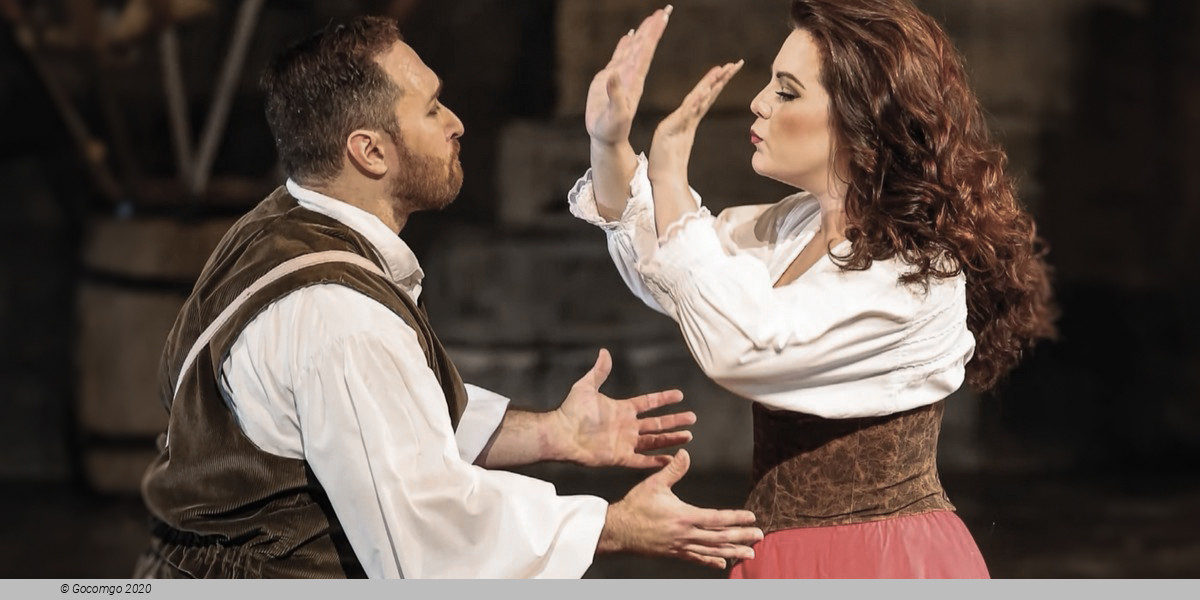
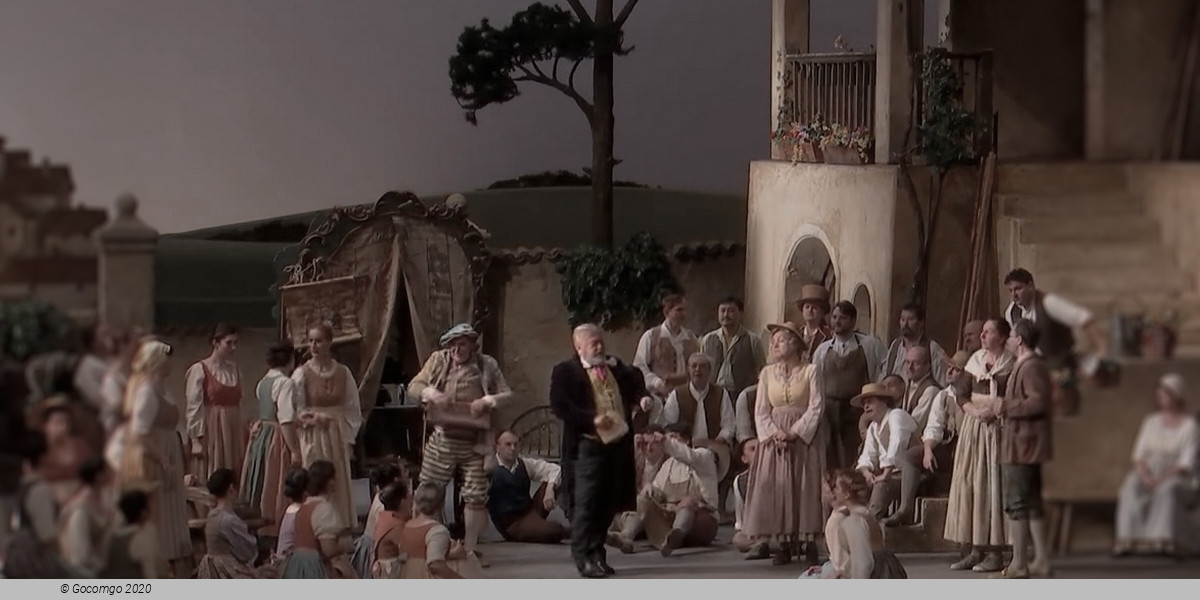
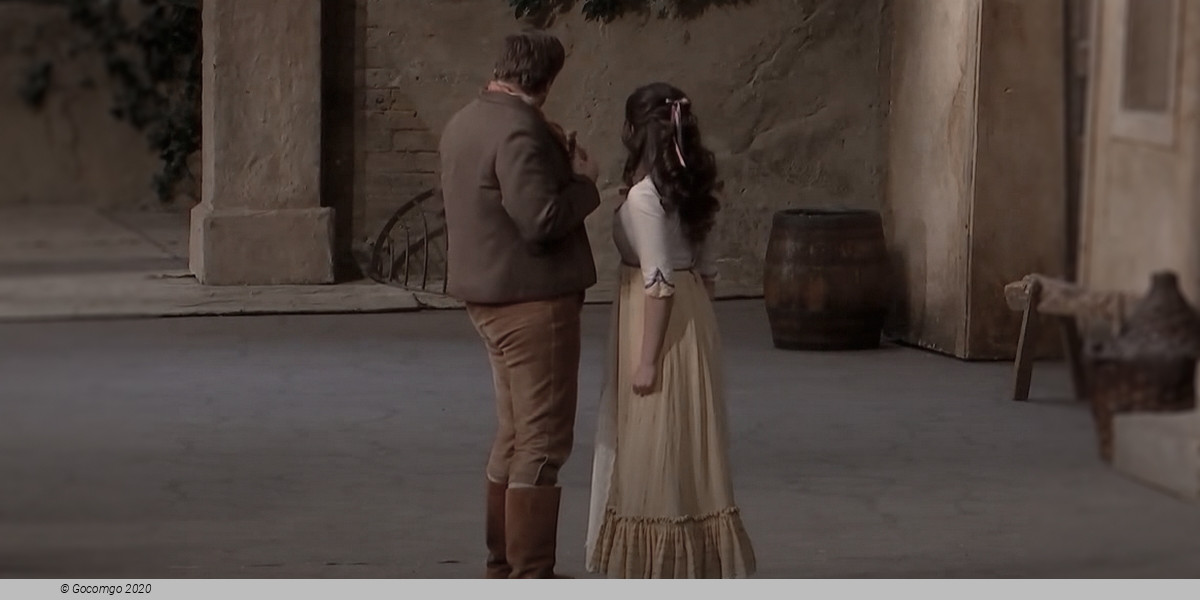
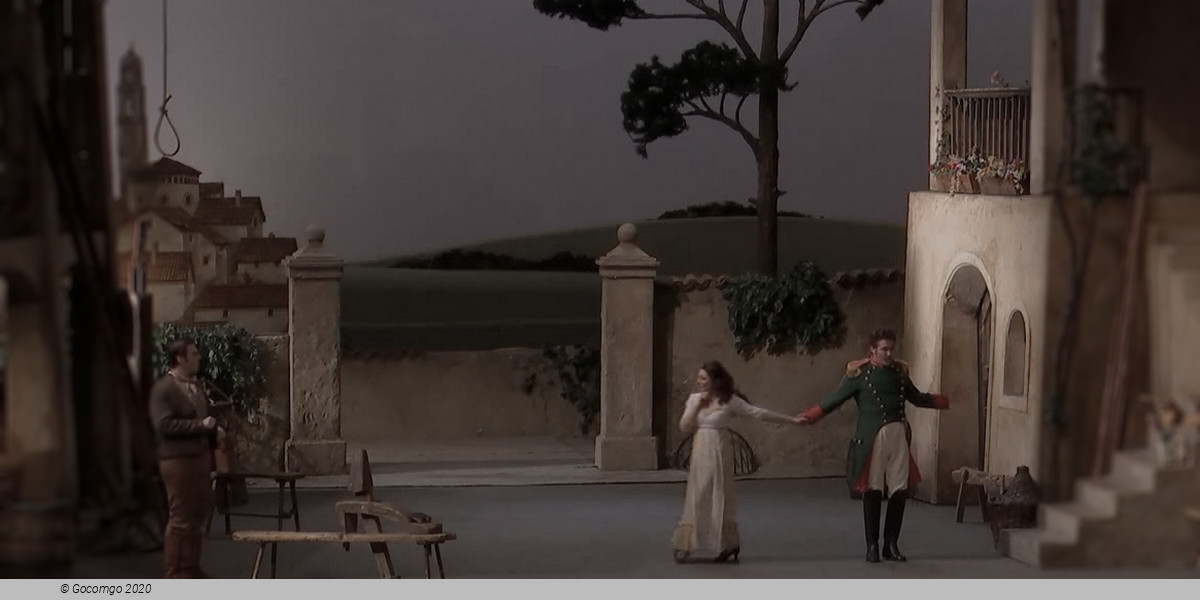
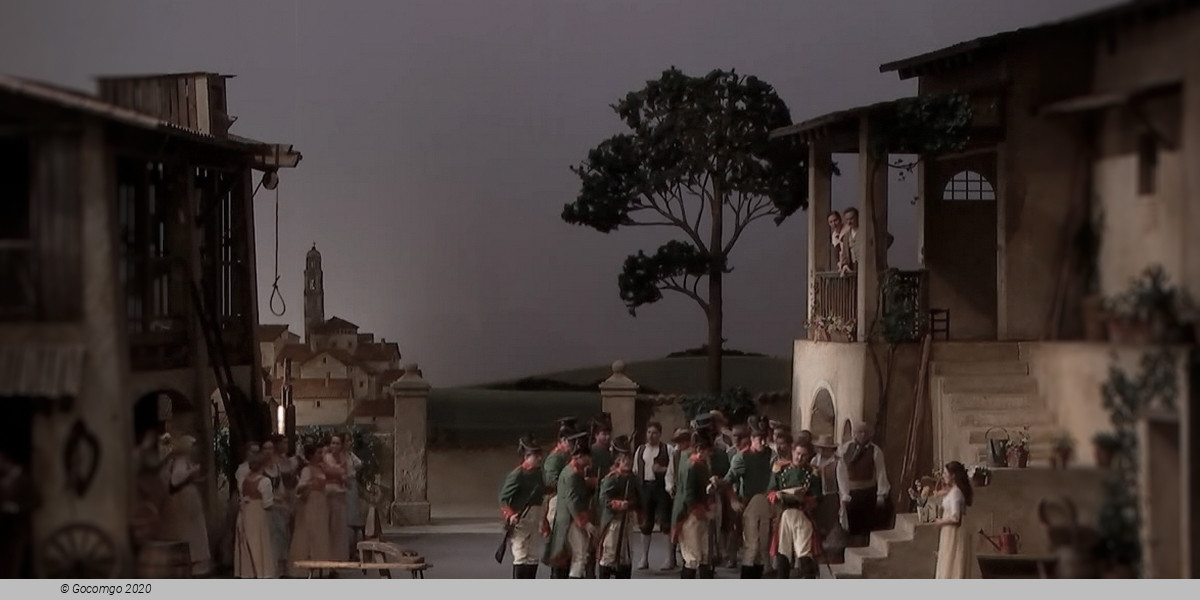
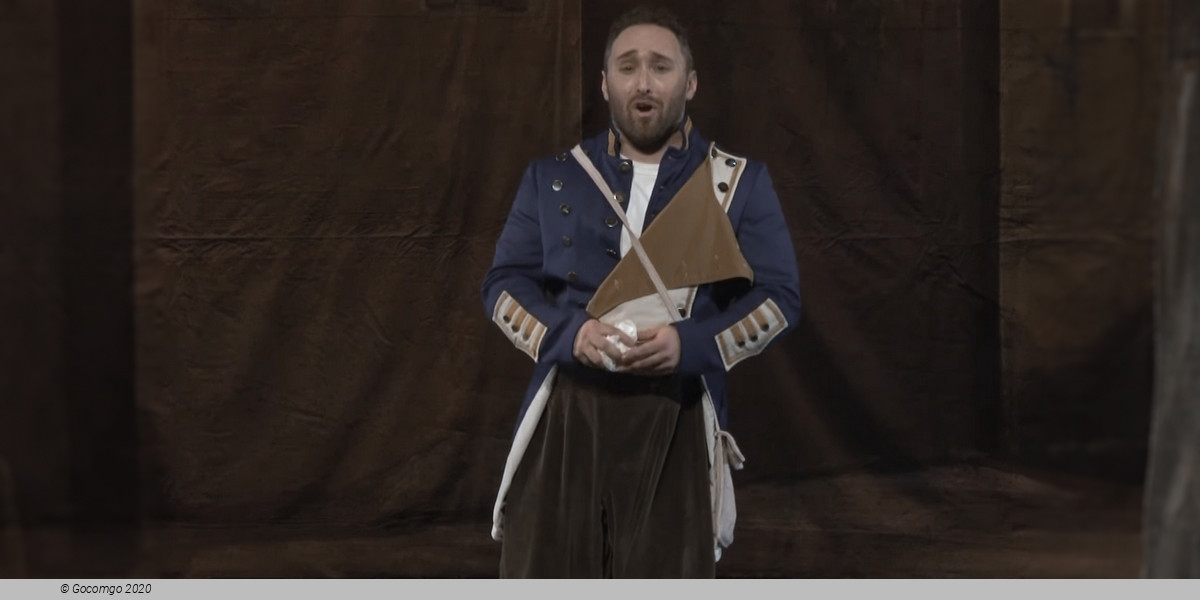
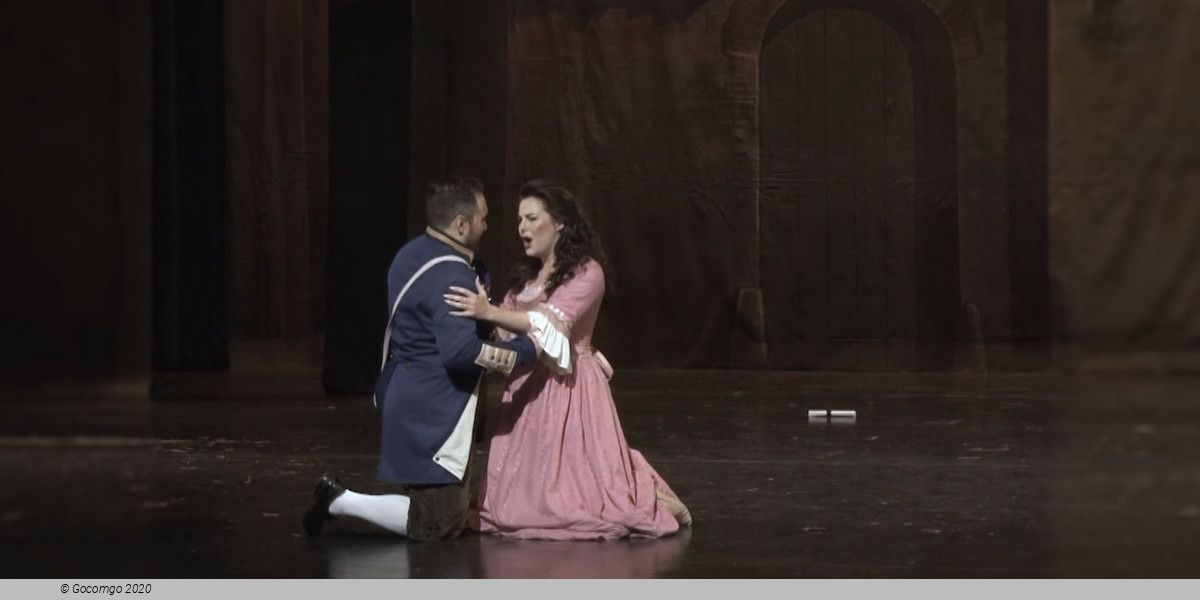
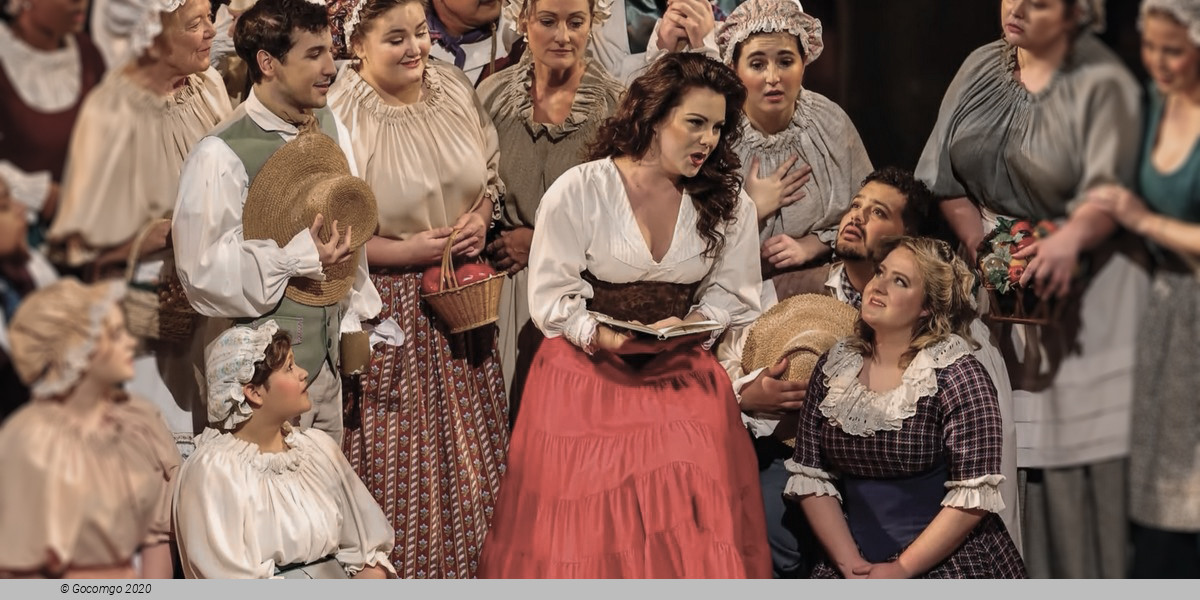
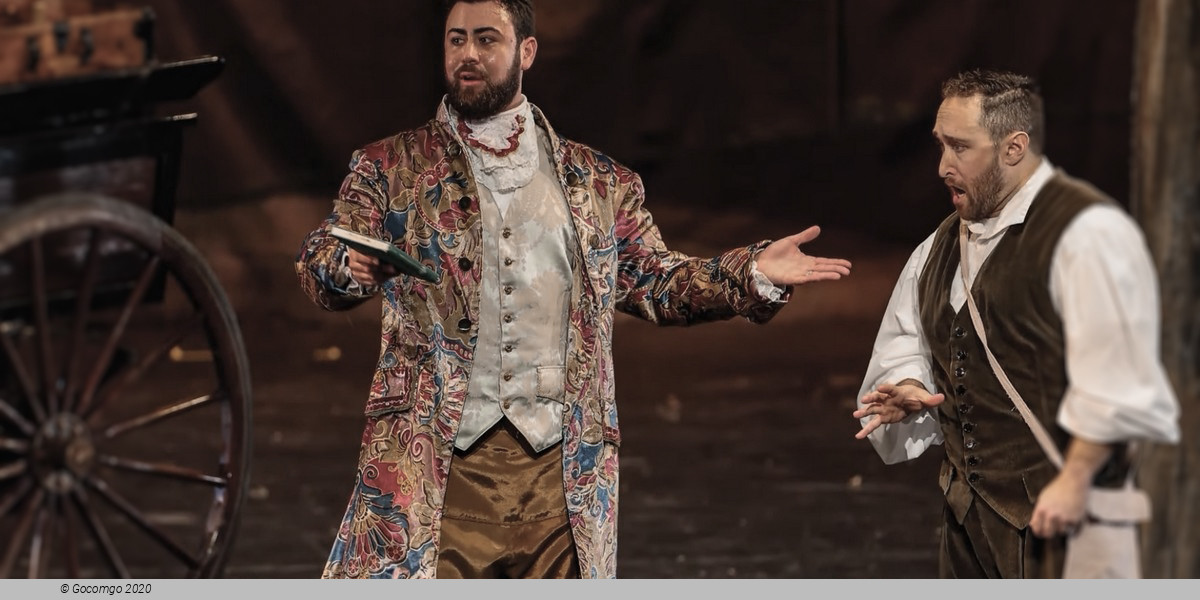
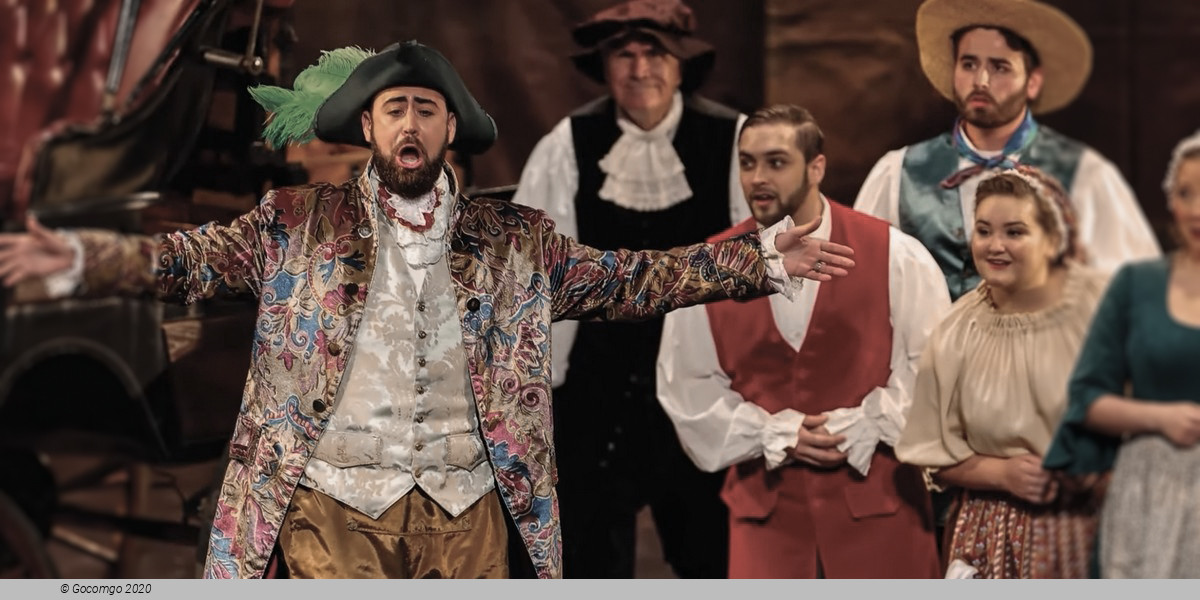
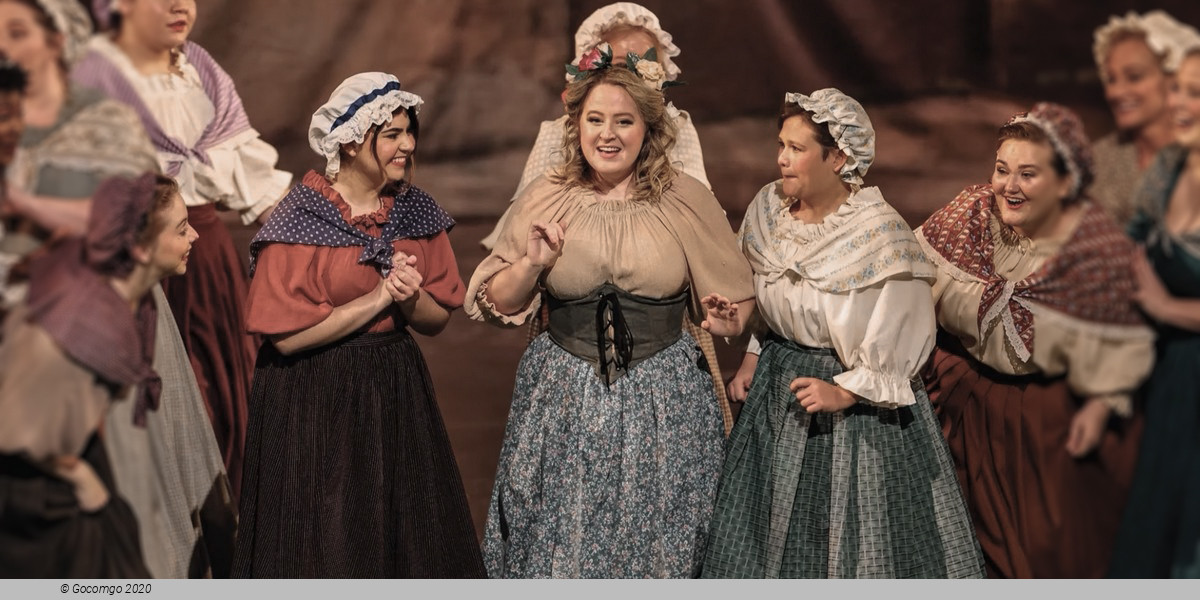
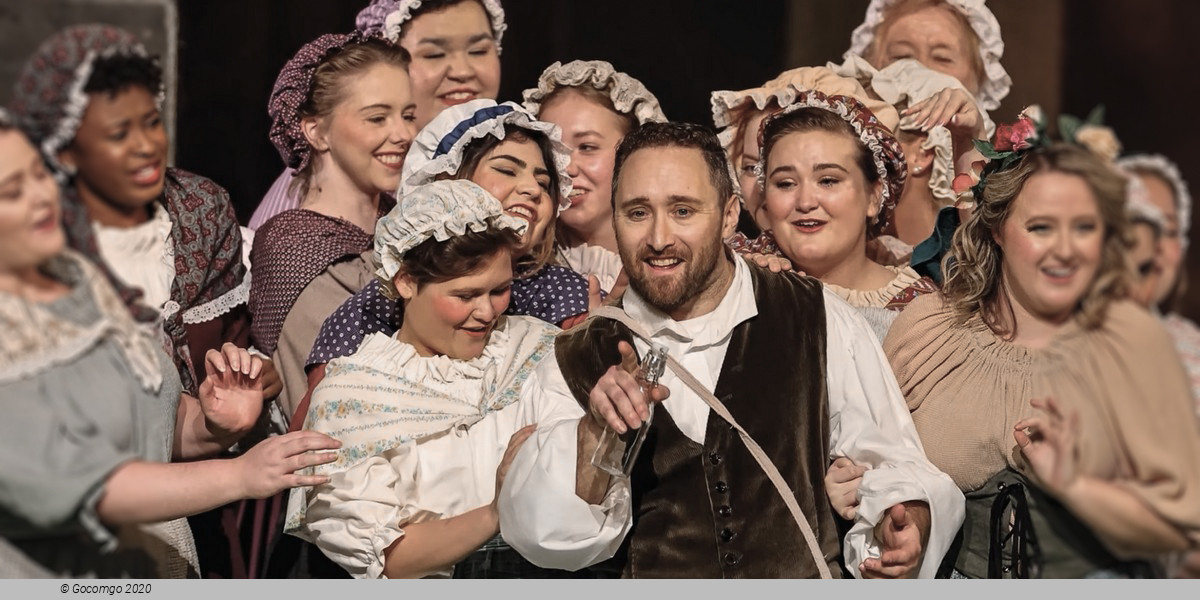
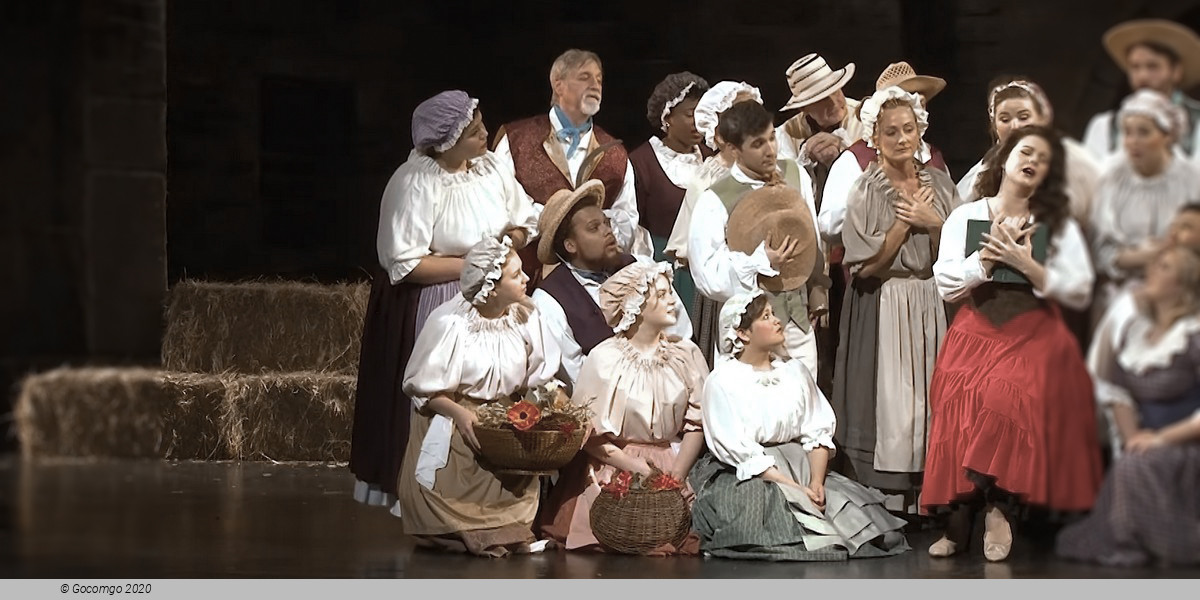
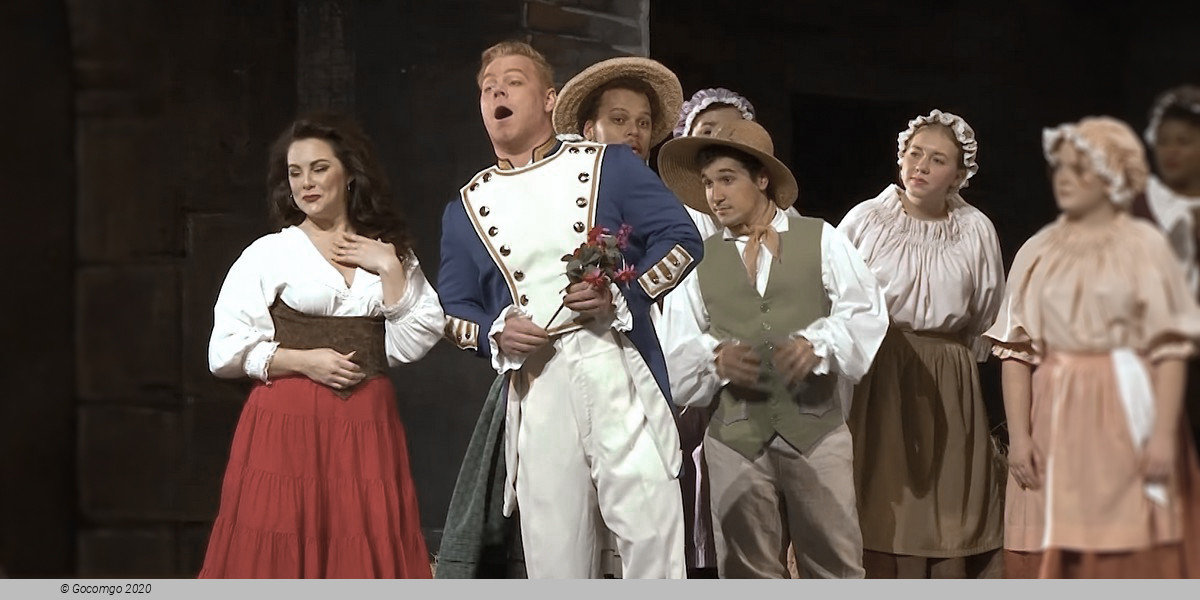
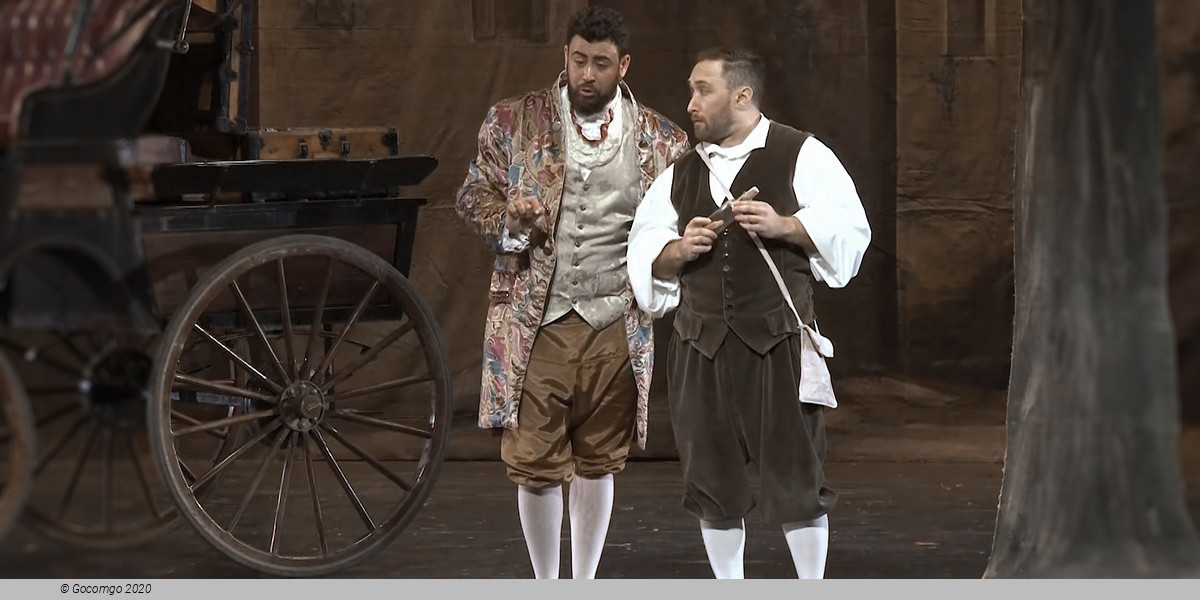
 1 Theatre Square
1 Theatre Square